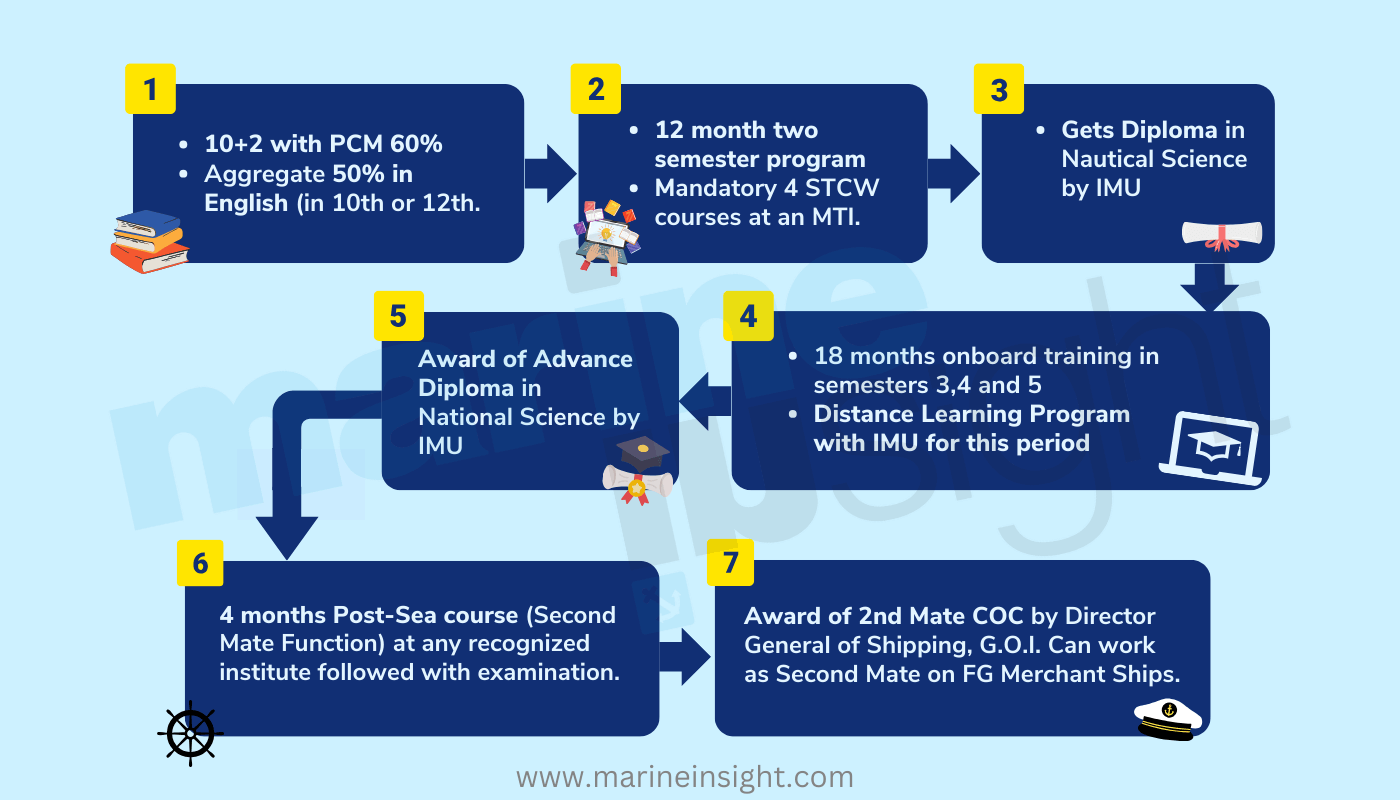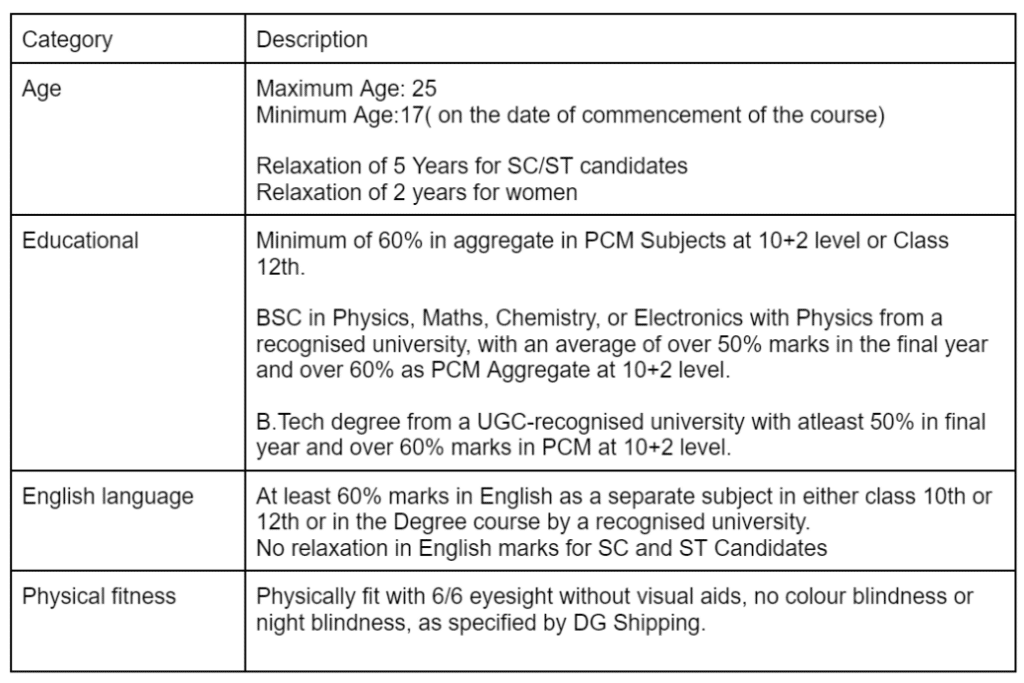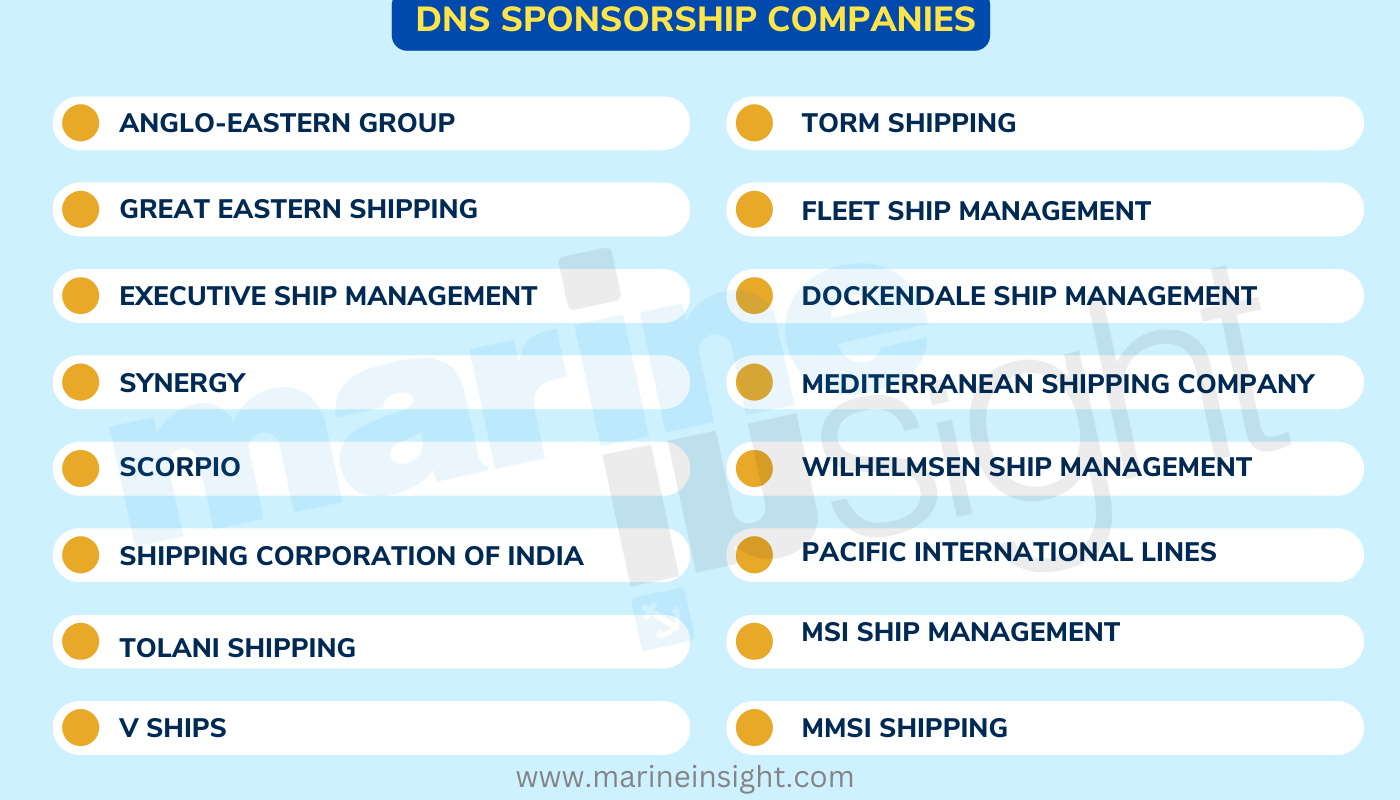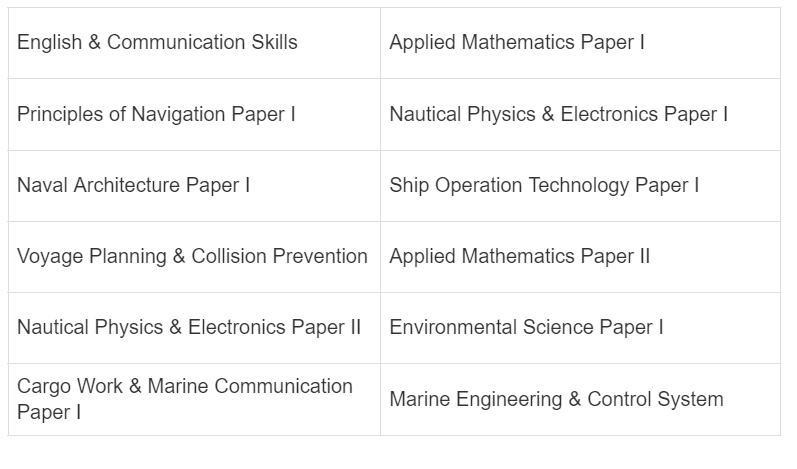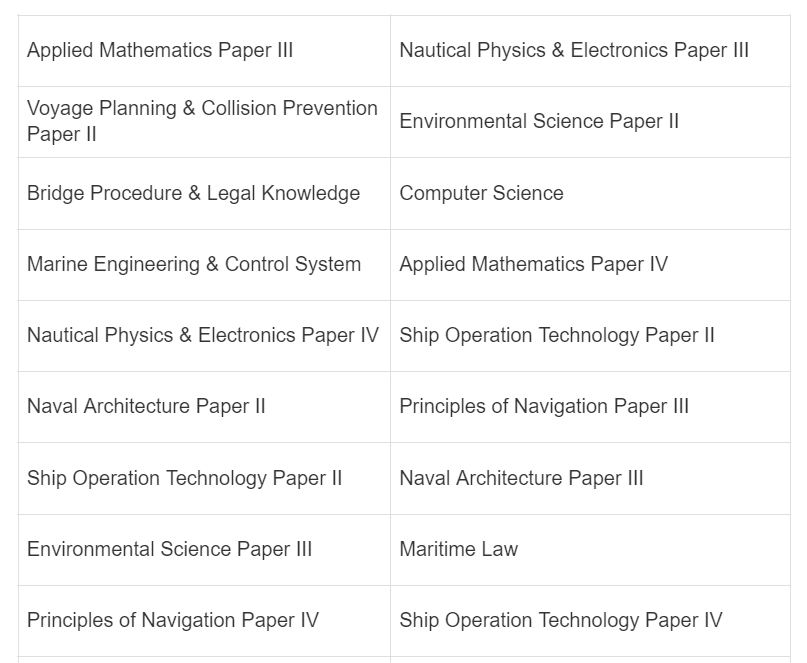A Guide To Nautical Science Diploma

The Nautical Science Diploma is an undergraduate course or program that lasts one year. It is an important course in the marine industry and offers a unique opportunity for class 12th students to pursue a career as a Deck Officer in the merchant navy. The course is two semesters long and focuses on practical skills and theoretical knowledge.
One can be admitted to this course on merit or after entrance exams. The average fee of a nautical science diploma in a good maritime college ranges from INR 4,50,000 to INR 7,50,000 (Indian Rupees).
After completing this course, one can work in Indian Naval Sciences, weather forecasting centres, port operations companies, and educational institutes. A graduate with a nautical science diploma can expect a starting salary of at least 250 USD monthly, which increases with experience and skills acquired.
Focus of Study
- This full-time diploma course allows students to study naval ships, their functioning, technicalities, safety and fire prevention and acquire the required communication skills to become seafarers in merchant navy.
- It allows students to apply the skills learnt to real-life situations.
- It includes subjects such as Applied Mathematics, Applied Chemistry, Applied Science, Applied Physics, Navigation chart work, Marine Electrical and Electronics, etc.
- The course aims to prepare students so they become excellent deck officers.
- The Nautical Science Diploma aims to meet the needs of the Nautical Department of the Merchant Navy.
Why was the course introduced?
DNS, or Diploma in Nautical Science, was introduced to produce more deck officers for the maritime industry. Over the years, many took the course; however, not all could secure employment in India, which proved to be a setback.
Hence, the Indian Government came up with a regulation that if someone wants to pursue a Nautical Science Diploma, they will have to get sponsorship first from a company. This means a candidate will be employed even before getting into college. Today, India ranks third in the world for producing deck officers.
DNS in Detail
- The 1-Year pre-sea training course is followed by 18 months of seatime training.
- Cadets get a stipend and free boarding and lodging during seatime training.
- After 18 months pre-sea and successful completion of 2nd mate COC license, one is awarded a BSC degree.
- A candidate becomes eligible for the 2nd mate CoC exam for the position of 3rd Mate, conducted by the Indian Government’s Mercantile Marine Department.
- After completing 18 months of onboard training, cadets must get an SSTP Completion certificate from the institution and appear for IMU Sem III, IV, and V examinations.
- Then, a cadet must complete 4 months of shore-based training ( Semester VI), the preparatory course for the 2nd Mates exam conducted by DGS/ Directorate-General of Shipping at approved institutions.
- Cadets must complete the compulsory STCW courses like ROC/ARPA, GMDSS, PSCRB, AFF, MFA, and ECDIS to get their ‘Second Mates’ (Foreign Going) license, which takes around 2 months.
- After passing the Second Mates exam and completing the STCW Courses, D.G Shipping, the Government of India awards the cadet a Second Mates (f.g) Certificate of Competency. They can join any seagoing vessel as a 3rd officer.
- After completing all six semesters, the cadet is given a B.SC Degree ( Applied Nautical Sciences) by IMU, the Indian Maritime University.
Eligibility Criteria
Admission Process for DNS
To get admission to the Nautical Science Diploma Course, one must have the sponsorship of a reputed shipping company and clear the IMU CET Exam with a decent rank.
IMU CET is Indian Maritime University’s Entrance Exam, conducted nationally every year. It is a three-hour exam with 200 MCQs from subjects like math, physics, chemistry, English, GK, and Aptitude. For DNS Aspirants, IMU CET is conducted twice yearly, in June and December. You can obtain more information about it on the official IMU website.
The second part is securing a sponsorship, but before that, let us see what it means.
Sponsorship means the shipping company already sees you as a future employee before your pre-sea training starts, which means the company has already given you a job offer. You don’t have to worry about placements after you complete the course.
Simply put, you will get a campus placement even before joining the college, which is the biggest benefit of this course. Hence, job security is not a headache if you opt for the Nautical Science Diploma Course.
Applying for DNS Sponsorship
Applications for sponsorship begin before the IMU CET Exam, so candidates must watch as shipping companies and colleges release their forms. To obtain the sponsorship, one has to pass an online test, a psychometric test, and an interview followed by medical rounds for the shipping company to which one applies.
So, if you apply for sponsorship at three to four companies, though the exam pattern may remain the same, the questions asked in the interview or test may differ depending on what the particular company chooses to focus on in an ideal candidate.
For e.g., Scorpio focuses more on reasoning and aptitude, Great Eastern focuses on current affairs and communication skills, and Anglo-Eastern focuses on Maths.
Be sure to prepare well for the interview. You can be asked questions about yourself, your weaknesses, and your strengths, from technical to non-technical.
Sponsorship defines your career, and getting one from a good company means that you have secured your future. The DNS eventually leads to a BSC Nautical Science Degree since it is a misconception that this is a diploma course and that one cannot opt for higher education in the future.
NOTE- Sponsorship doesn’t mean the shipping company will pay for your education.
You must submit the documents regarding your sponsorship and other details to the college you are applying to. The Indian Government has made it compulsory for candidates to get sponsorship before joining DNS pre-sea training.
Shipping Companies Offering Sponsorships for DNS
- Anglo-Eastern Group
- Great Eastern Shipping
- Executive Ship Management
- Synergy
- Scorpio
- Shipping Corporation of India
- Torm Shipping
- Fleet Ship Management
- Dockendale Ship Management
- Mediterranean Shipping Company
- Wilhelmsen Ship Management
- Tolani Shipping
- Pacific International Lines
- V Ships
- MSI Ship Management
- MMSI Shipping
Some Companies which recruit DNS Graduates
- Northern Marine Management (India) Pvt. Ltd.
- ONGC Essar Shipment
- ABG Shipyard Ocean Shipping Service PVT.LTD
- ITT Shipping (P) Ltd
- American Cruise Lines
- SAIL Carnival Cruise Line
DNS Syllabus
The syllabus for a Nautical Science course may vary slightly from college to college. However, the broad topics remain the same.
The syllabus of DNS is mentioned below.
Diploma in Nautical Science Semester 1 Syllabus
- Chartwork
- Navigation
- Maritime History
- HR
- English (Part of English)
- Applied Maths
- Applied Physics
- Electrical
- Electronics
- Bridge Equipment
- Ship Construction
- Stability
- Cargo work
- Seamanship
- Workshop (Practical only)
Diploma in Nautical Science Semester 2 Syllabus
- Chartwork
- Navigation
- English Lab (Practicals)
- Bridge Equipment
- Navigation lab (practical)
- Workshop (practical)
- Ship Construction
- Stability
- Cargo work
- Seamanship(both practical and theory)
- MARPOL
- Marine Engineering
DNS Subjects
Some Important Books for DNS
- A Guide to Collision Avoidance Rules by A.N. Cockcroft & J.N.F. Lameijer
- Seamanship Techniques: Shipboard and Marine Operations by David J House
- Ship Stability for Masters and Mates by Bryan Barrass
Best Colleges in India for Nautical Science Diploma
- Hindustan Institute of Maritime Training, Chennai
- Tolani Maritime Institute, Pune
- Haldia Institute of Maritime Studies and Research, Medinipur
- Southern Academy of Maritime Studies, Chennai
- B.P Marine Academy, Raigarh
- Maritime Foundation, Chennai
- International Maritime Academy, Uttar Pradesh
- Applied Research International, New Delhi
- Dr. B.R. Ambedkar Institute of Technology, Port Blair
- Vishwakarma Maritime Institute, Pune
- Indian Maritime University, Navi Mumbai
- Shriram Institute of Maritime Studies, New Delhi
- The Great Eastern Institute of Maritime Studies, Pune
- Cosmopolitan Technology of Maritime College, Chennai
Best Colleges for DNS Abroad
- Nelson Marlborough Institute of Technology
- Humber College
- Centennial College
- St. Clair College
- Conestoga College
Future Prospects
- After completing the DNS Course, one can become a training cadet.
- After finishing 18 months of sea duty, one can also attempt the 2nd Mate Exam. After clearing the exam, one advances to the rank of 3rd Officer.
- It is also possible to work on cruise ships.
- One is trained to work as a Navigation officer on merchant navy ships.
- Candidates can pursue higher studies or work in sectors such as Indian Naval Sciences, Port Operations, Weather Forecasting Centres, and Maritime Educational Institutions.
- Apply for internships or opt for a Post Graduate Diploma in Nautical Science or B.SC, B.E, M.SC, MBA programs.
Career Options
Navigating Officer: Also called deck officers, they are responsible for the ship, loading and unloading operations, maintaining proper documentation, and overall administration of the vessel.
Captain: After completing DNS, it takes about 12 to 15 years to become a captain. A captain is responsible for the ship’s safety and overall operations, including the people and cargo onboard.
Conclusion
A Nautical Science Diploma or a DNS Course is a good option for a student who has finished their 10+2 and wants to start a career in the merchant navy. It is the first step in the process of becoming a seafarer. After completing the course, one can opt for internships or higher studies. One can also work as a deck officer after completing this course. The best thing is that if one pursues this course in India, one needs to secure a sponsorship from a shipping company before joining the course. This means you have a job even before going to college, so you do not have to worry about job security.
Frequently Asked Questions
1. What is the duration of the DNS course?
The Nautical Science Diploma is an undergraduate course or program that lasts one year.
2. What is the average fee for a diploma in nautical science?
The average fee for the diploma in nautical science ranges between Rs. INR 4,50,000 to INR 7,50,000.
3. What is the average salary of deck officers?
The average salary of a deck officer is Rs. 150,000 per month.
4. Why was this course introduced?
DNS, or Diploma in Nautical Science, was introduced to produce more deck officers for the maritime industry.
5. What is the benefit of pursuing a DNS course in India?
If someone wants to pursue a Nautical Science Diploma, they must get sponsorship first from a shipping company. This means a candidate will be employed even before getting into college.
6. What is the maximum and minimum age to pursue this course?
The maximum age is 25, and the minimum age is 17 on the date of commencement of the course. SC and ST Candidates are given a 5-year relaxation, and women candidates are given a 2-year relaxation.
7. What are the academic criteria for a Diploma in Nautical Science course?
Minimum of 60% in aggregate in PCM Subjects at 10+2 level or Class 12th.
BSC in Physics, Maths, Chemistry, or Electronics with Physics from a recognised university, with an average of over 50% marks in the final year and over 60% as PCM Aggregate at 10+2 level.
B.Tech degree from a UGC-recognised university with at least 50% in final year and over 60% marks in PCM at 10+2 level.
8. What are the top Diploma in Nautical Science colleges/Shipping companies?
For DNS, it is not college that matters but the company from which you get sponsorship.
9. What is the duration of onboard training for the Diploma in Nautical Science Cadet?
18 months, after which cadets are eligible for their VI semester post-sea training.
You might also like to read-
- A Guide To IMU CET Exam 2024
- A Guide to Merchant Navy Ranks
- The Ultimate Guide To Join Merchant Navy
- 8 Myths To Be Cleared Up Before Joining Merchant Navy
- What is the Difference between Merchant Navy and Defence Navy?
- 10 Common Questions Asked by Aspiring Merchant Navy Professionals
Disclaimer :
The information contained in this website is for general information purposes only. While we endeavour to keep the information up to date and correct, we make no representations or warranties of any kind, express or implied, about the completeness, accuracy, reliability, suitability or availability with respect to the website or the information, products, services, or related graphics contained on the website for any purpose. Any reliance you place on such information is therefore strictly at your own risk.
In no event will we be liable for any loss or damage including without limitation, indirect or consequential loss or damage, or any loss or damage whatsoever arising from loss of data or profits arising out of, or in connection with, the use of this website.
Do you have info to share with us ? Suggest a correction
Disclaimer :
The information contained in this website is for general information purposes only. While we endeavour to keep the information up to date and correct, we make no representations or warranties of any kind, express or implied, about the completeness, accuracy, reliability, suitability or availability with respect to the website or the information, products, services, or related graphics contained on the website for any purpose. Any reliance you place on such information is therefore strictly at your own risk.
In no event will we be liable for any loss or damage including without limitation, indirect or consequential loss or damage, or any loss or damage whatsoever arising from loss of data or profits arising out of, or in connection with, the use of this website.

About Author
Zahra is an alumna of Miranda House, University of Delhi. She is an avid writer, possessing immaculate research and editing skills. Author of several academic papers, she has also worked as a freelance writer, producing many technical, creative and marketing pieces. A true aesthete at heart, she loves books a little more than anything else.
Latest Marine career Articles You Would Like:
Daily Maritime News, Straight To Your Inbox
Sign Up To Get Daily Newsletters
Join over 60k+ people who read our daily newsletters
By subscribing, you agree to our Privacy Policy and may receive occasional deal communications; you can unsubscribe anytime.



